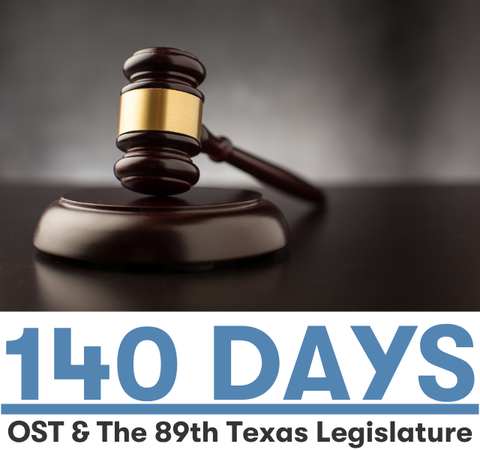140 Days Have Come & Gone
June 5, 2025

Monday marked the end of the 89th Session of the Texas Legislature, when both chambers gavel out ‘Sine Die’ until January 2027. More than 8,700 bills were filed this session, the highest number on record, and of those, approximately 1,200 passed. This passage rate of 13.5% is one of the lowest in the 21st century. Over the last 25 years, legislators have filed more bills while passing fewer; in the 2001 session, just 5,544 bills were filed, and 1,600 passed.
Among those bills that passed are the biennial budget, SB 1, which appropriates $338 billion in funds over the next two years. This includes $149 billion in state general revenue, with the rest of the funds expended coming from dedicated or federal sources. Key priorities in the budget include: property tax relief, school finance, education savings accounts, child care, border security, water infrastructure, and electricity.
In a state with no income tax, property tax relief costs have ballooned in recent sessions, accounting for more than $50 billion over the biennium. Legislators put more than $8 billion in new dollars into public education, though the mechanisms by which this funding will flow to schools were the topic of heated debate that left many school leaders disappointed. $1 billion is set aside for education savings accounts, or vouchers, which finally passed both chambers after years of opposition in the Texas House in particular. The state has also invested additional resources in the Texas Energy Fund and created a Texas Water Fund, which will pay for new water supply projects across the state.
Importantly, the state has committed $100 million to child care scholarships, which will make a significant impact on clearing a waitlist of 95,000 families who are waiting for this support.
While not a driver of costs in a budget of this size, OST CARES remains in the budget for another session! Many point out that the budget is the truest reflection of the legislature’s priorities, and with this continued investment, Texas is making clear its commitment to youth mental health. While the statistics remain sobering, we know that OST is a vital space to engage young people and implement promotion and prevention strategies to build resilience and foster positive development.
This is an enormous accomplishment and a credit to the immediate impact of this program. TXPOST is honored to continue OST CARES and deepen its reach across the state over the next two years. Thank you to all of you who have participated in the program and remain committed to serving the young people in your communities—we’re excited to build on the incredible foundation you have forged with us.
So what happens next?
With the session now over, there’s one more key step before every bill becomes a law: the Governor’s signature. The governor can sign a bill, veto it, or let it become law without his signature. For those bills passed earlier in the Session, the Governor had 10 days to take one of these actions. For the hundred of bills that closed in on Sine Die, he has until Sunday, June 22, to make his decision.
Importantly, the governor has one additional power when it comes to appropriations: the line-item veto. The governor has the authority to strike any individual appropriation, meaning that OST CARES is also not completely in the clear just yet. We’re monitoring closely and will update you when the budget passes. Until then, we remain cautiously optimistic and committed to advocating for the full preservation of OST CARES funding.

